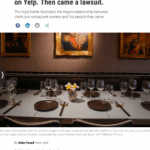She reviewed a Tampa restaurant on Yelp. Then came a lawsuit.

The legal battle illustrates the fragile relationship between chefs and restaurant owners and the people they serve.
By Helen Freund Times staff June 4, 2025
Helen Freund is the food and dining critic, reporting on and reviewing restaurants throughout Tampa Bay. Reach her at hfreund@tampabay.com.
In December 2023, Irene Eng sat down for dinner at Hales Blackbrick, a popular spot off Dale Mabry Highway in Tampa specializing in “seasonal New Asian” cuisine.
She and her group of friends dug into dishes that included tiger shrimp, lamb chops, spare ribs, eggplant and mushrooms and chocolate cake.
Then Eng did what she often does after a meal: went online to leave a review.
“Probably will return: one of better fusion restaurants I’ve been to in Florida,” the Wimauma woman began in her 795-word critique. “But the meat quality is subpar.”
After she posted her review, things escalated quickly. The restaurant responded to Eng’s post, calling it abusive, disrespectful and arrogant. The restaurant’s executive chef and owner, Richard Hales, sent Eng a cease-and-desist letter after Eng reposted the same review on Yelp, Google and Tripadvisor. Then he filed a lawsuit.
Yelp added a pop-up consumer alert to Hales Blackbrick‘s page warning diners that the “business may have tried to abuse the legal system in an effort to stifle free speech.”
Though a judge eventually dismissed the lawsuit, the legal row illustrates the fragile, sometimes contentious, relationship between chefs, restaurant owners and the people they serve. Platforms like Yelp, Tripadvisor and other sites give diners the chance to speak candidly about their experiences, ranking and reviewing restaurants as if they were food critics at a local news outlet. But there are few guardrails to ensure fairness and accuracy in an online world where anyone can share their opinions with the masses at a whim.
In an industry that survives or fails based on praise or criticism from customers, it’s not unusual for a frustrated chef or restaurant owner to respond publicly to a user-posted review. Still, lawsuits like these are rarer. Online reviews are generally considered protected speech under the First Amendment.
But should diners be able to say whatever they want about a restaurant on the internet? And what, if anything, can a chef or restaurant owner do in response?
The platform
Yelp, a website founded in 2004 that allows for crowdsourced business reviews, boasts an average of 2.5 million visitors daily. Tripadvisor and Google Reviews offer other avenues for user reviews, as do groups on sites like Nextdoor and Facebook and social media platforms like Instagram and TikTok.
Yelp has a robust following in Tampa Bay. The site has “Elite” users, a selective membership offered to reviewers who post and photograph their experiences on the platform often. What it takes to become — and stay — an Elite user isn’t explicitly stated. But such members receive a badge on their profile and are invited to events ranging from cocktail parties to fitness classes. Eng is one such Elite user.
Anna Peterson is fairly new to Yelp, but has already made the Elite cut. She started reviewing restaurants and businesses around Tampa Bay deliberately to achieve Elite status, she said. A designer for a tech company, the 24-year-old Tampa resident said she takes writing reviews seriously, assessing a restaurant’s environment, cleanliness, service, price and food quality.
“I really value integrity,” she said. “I would not just write a positive review, especially if that’s not the truth of the experience.”
For chefs and restaurant owners, user-generated reviews are a mixed bag. Positive reviews and high rankings can bring business, but too many bad reviews can tank a restaurant.
“It can go really well and it can go really bad,” said Felicia Lacalle, executive chef at Teak in St. Petersburg. “You have to read them with an open mind, and not so much of a chef’s ego.”
But restaurants can do little when dealing with a review they find unnecessarily negative or unfair. Once a review is up, it can be hard to get it taken down. Often, diners will post their feedback during a restaurant’s first few weeks of business, when most places are still finding their footing. In contrast, traditional restaurant critics typically wait a minimum of two months before publishing a review to ensure a restaurant has time to work out the kinks. Many news organizations that publish restaurant reviews also mandate rigorous research, reporting and fact-checking prior to publishing, none of which is required on user-generated review platforms.
Will Payne, an assistant professor of geographic information science at Rutgers University, has studied the effects of “review bombing,” where businesses receive an influx of reviews. While some negative reviews might not make much of an impact, restaurants that receive a sudden onslaught of them could see their rankings drop.
This can happen, for instance, if a restaurant participates in a city-wide Restaurant Week promotion where there is increased attention and business within a short time, Payne said.
“If the restaurant screws up … it can lead to these situations where they thought they were boosting their image, but then you’ve got 30 three-star reviews. You can get burned from stuff like that.”
This sort of thing doesn’t just play out on Yelp. How diners find restaurants is changing, and a younger generation has increasingly moved toward user-generated reviews on social media sites like Instagram and TikTok when looking for businesses, Payne said.
The Facebook page St. Petersburg Foodies Best Restaurants is a popular place for local diners to leave reviews and restaurant recommendations, with more than 34,000 members. The group has strict rules about negative reviews: They are allowed, but reviewers have to substantiate complaints with a detailed description of their experience, which are sometimes fact-checked by the site’s moderators.
Many Tampa Bay chefs and restaurant owners interviewed said that, overall, online reviews appear to skew toward negative experiences. And while a restaurant might undergo several changes or improvements over the years, what’s visible to readers online might not reflect the most accurate or up-to-date information.
“We’re quick to bash somebody, but we’re not quick to hype them up,” said Joe Dodd, who owns Tampa-based hot chicken concept King of the Coop. “We now have all these platforms where people can say what they want to say, but people forget that saying what you want to say comes with consequences.”
The lawsuit
Eng, who has penned more than 660 reviews on everything from restaurants and beaches to libraries and urgent care facilities, joined Yelp 13 years ago.
She’s praised spots for their “awesome” charcuterie boards, “yummy” crab cakes and “substantial” utensils. She’s also slammed restaurants for bland quesadillas, disposable chopsticks, rude customer service and moldy bell peppers.
Eng’s Dec. 11, 2023, review of Hales Blackbrick wasn’t an overwhelmingly positive one, though it wasn’t exactly a diatribe, either.
She thought the food was “well presented” but a “bit too sweet.” She knocked a server for “odd” wine etiquette.
A dish of spare ribs was “so so,” Eng wrote, and Hawaiian prime ribs were “the worst: way too much fat.” Eggplant and mushrooms were “wonderful” while the tiger shrimp were “tasty and succulent.” She admits to not trying the Yangzhou fried rice, but adds that her friends thought it was “greasy.” Coffee was served lukewarm — “a Cardinal sin!!” she wrote.
“The better Cantonese restaurants serve their spare ribs tender and moist,” she wrote. “Theirs is neither: looking unappetizing, dry and could use more cooking time.”
Eng mentioned Hales’ “impressive mobile home parked in the lot,” and included a photo of the vehicle. She questioned the description of a dish with Sichuan origins. (Eng is Chinese.) She also included a photograph of Hales’ wife in the review.
Backlash from the restaurant was swift.
“Hello Irene What an abusive review,” the response from Hales Blackbrick read on Yelp, according to a screenshot later included in court records. “Nothing here to take and learn from with the tone of arrogance and disrespect for what we have done in Tampa.” (The response from the restaurant appears to have been removed from Yelp.)
After Eng reposted the review on Google and Yelp, an attorney for Hales and his wife, Jenny Hales, sent Eng a cease-and-desist letter. Calling Eng’s comments “false and defamatory,” the letter demanded that Eng remove her posts and “unauthorized photographs.” It also asked her to issue a public retraction and apology, none of which she did, according to Hales.
Eng declined to comment for this story on the advice of her attorney.
On Nov. 13, 2024, Hales, under the name of his company, Pop N Sons Diner, filed a complaint against Eng in Hillsborough County’s 13th Judicial Circuit Court, asking for damages in excess of $50,000. In it, he claimed that Eng republished her original review in January on both Yelp and Google and again in October.
Hales claimed that Eng’s review included false statements about her dining experience and that her reposting of the review adversely impacted the restaurant’s Search Engine Optimization rankings on Google. The lawsuit also claimed that Eng’s “misconduct” caused the restaurant to lose “significant revenue from its long-time recurring customers and prospective patrons who utilize these crowd-sourced review and reservation platforms to discover, research and book reservations to dine there.”
Hales didn’t pursue a defamation claim. Instead, the chef said Eng’s actions amounted to “tortious interference,” which is when someone intentionally damages a contractual or business relationship.
In February, Hillsborough Circuit Judge Christine A. Marlewski dismissed the case and wrote in her ruling that Hales Blackbrick failed to prove its claims. Eng’s reviews were made to the “public at large,” Marlewski said. “She did not target or address her review to any specific person or any existing business relationships of Plaintiff.”
On her personal blog, Eng in February celebrated the dismissal and called the lawsuit “frivolous.” “They sure will come back and try again,” she wrote. “But that won’t deter me from celebrating my first milestone: defending my right to speak truth.”
When reached by phone, Hales said the case was dismissed after he decided not to pursue it further. In April, he closed the Dale Mabry Highway location of Hales Blackbrick to focus exclusively on a newer, larger restaurant in Hyde Park. He said the shutter had nothing to do with the lawsuit.
He said he’s had businesses applaud him for going after a reviewer. But he also said he knows Eng has a right to share her opinion.
“I’m 1,000% for freedom of speech — you can say whatever you want,” Hales said.
People forget that chefs aren’t perfect, he said.
“If you do lash out, a lot of people will say ‘Well you’re thin-skinned and you can’t take any criticism,’” he said. “But that’s completely untrue because we exist in a world of praise and criticism every day all day, whether it’s live, in our face, or online. We’re not thin-skinned, we’re just humans.”
Navigating an online world
While pursuing legal action against an online reviewer isn’t common, it’s not unheard of, either.
Aaron Schur, general counsel at Yelp, said in an emailed statement that while it is rare for businesses to sue customers on the platform, “when we receive evidence that a business may be misusing the legal system to intimidate or silence reviewers, we carefully examine it.”
Last year, Yelp placed 16 Questionable Legal Threat alerts — pop-up warnings like the one that appears on Hales Blackbrick‘s Yelp page. Of those, Yelp said 19% stemmed from business owners who made legal threats to customers to suppress their views. The vast majority — 81% — were in response to reports of “gag clauses,” where business owners require would-be patrons to agree ahead of time not to post negative online reviews.
“Reviewers have a First Amendment right to honestly describe their experiences with local businesses, and deserve to know when a business tries to deny them that right,” Schur said.
Once a negative review is posted, it can be difficult for a restaurant or business owner to take down. But it does happen: According to Yelp‘s 2024 Trust & Safety Report, the company removed over 185,000 reviews last year. Causes for automatic removal can range from conflicts of interest to anything the company deems “inappropriate material,” such as threats, lewd comments or hate speech.
Some restaurant owners say that doesn’t go far enough, in particular when it comes to reviews that feel harsh or misleading. And opinions vary on the best way to respond to a negative review. But chefs and business owners can try to steer the conversation with reviewers: A positive exchange can bring back repeat business, while responding to a negative review with rancor usually isn’t productive.
Dodd, of Tampa’s King of the Coop, said he’s learned over the years to bite his tongue instead of responding to negative reviews brashly online. But he said he finds it frustrating when, instead of bringing something to his attention in person, diners head online to slam the restaurant.
“If you’re at a restaurant, why not give them the courtesy and the opportunity to make up for whatever mistake or issue you might have had?” Dodd said.
Rather than react immediately, Kelly Rodriguez, co-owner of St. Petersburg’s Lolita’s Wine Market, said she lets herself “percolate” and wait at least 72 hours before responding.
“No restaurant is going to be perfect,” she said. “The proof really is how we take care of those issues when they occur.”
Chon Nguyen, partner at the Tampa-based restaurant group Proper House Group, said he tries to meet customers where they are.
“I do make it a point to not take a defensive approach,” Nguyen said. “If someone publishes a negative review, I’m always trying to engage them. I’m seeking to understand their perspective.”
Hales said he knows he’s responded with a quick temper to some reviews in the past.
“Especially earlier in my career that would be something that (was) my fault,” he said. “When you’re just prideful of your accomplishments and then somebody tries to tear them down and you feel it’s unreasonable, you may lash out.”
Now, with the lawsuit behind him, Hales said he’s eager to move on.
“It’s a love-hate relationship always with these sites because they certainly can bring you business, but they also can certainly turn business away,” he said. “We just have to deal with it.”







